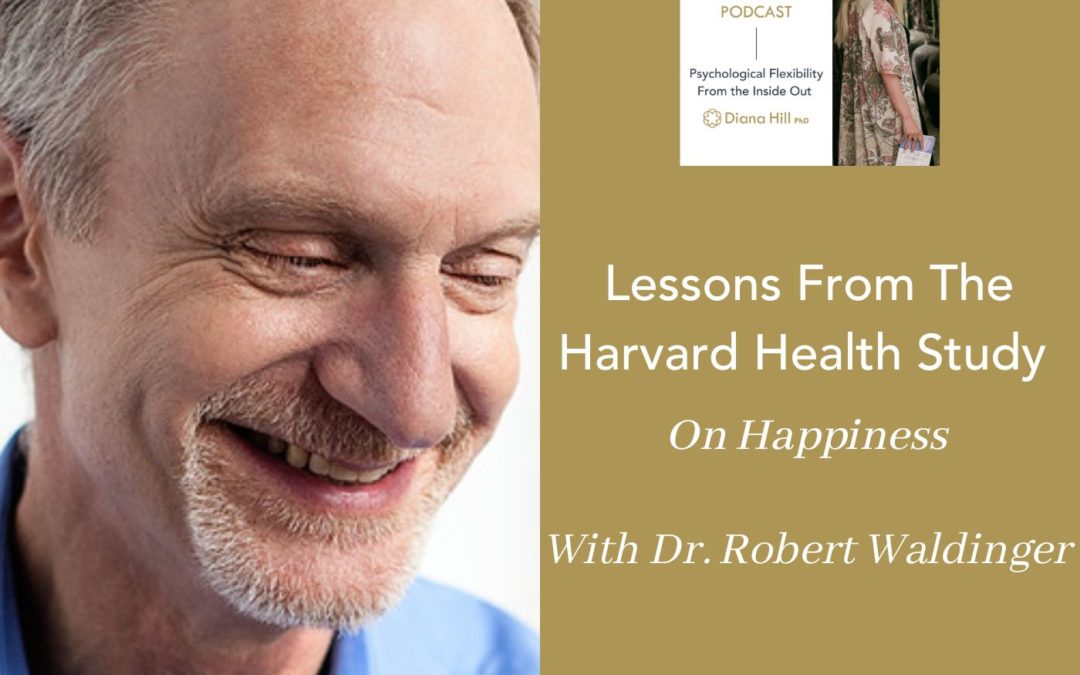The Harvard Study of Adult Development is the longest scientific study of happiness and health that’s ever been conducted. The results? Strong relationships make you feel better and live longer. Dr. Diana Hill sits down with psychiatrist and Zen priest Dr. Robert Waldinger to discuss his research findings and strategies you can use to make your friendships, partnerships, work relationships, and even casual ties more meaningful.
Listen and Learn:
- The evolution of the Harvard Health Study
- Dr. Waldinger’s answers to his own research questions
- Why relationships are so good for our health
- How to map out your social universe
- How Zen informs Dr. Waldinger’s research
- The science of seeking to understand vs. seeking accuracy
- The power of generosity and attention in relationships
- Why you should order your coffee in person
- An exercise to reflect on your life
- The question Dr. Waldinger really wants to answer
About Dr. Robert Waldinger
Robert Waldinger is a professor of psychiatry at Harvard Medical School, director of the Harvard Study of Adult Development at Massachusetts General Hospital, and cofounder of the Lifespan Research Foundation. Dr. Waldinger received his AB from Harvard College and his MD from Harvard Medical School. He is a practicing psychiatrist and psychoanalyst, and he directs a psychotherapy teaching program for Harvard psychiatry residents. He is also a Zen master (Roshi) and teaches meditation in New England and around the world. Robert is the co-author of the book The Good Life: Lessons From the World’s Longest Scientific Study on Happiness (Simon and Schuster; January 10, 2023).
Related Resources
- Become a MORE Life in Process member to support the show. You’ll be designated as a “Founding Member” as we build a community to discuss ideas and our practice from the show. Founding Members receive exclusive bonus content from Diana.
- Find out what kind of Striver you are and get your free Skillful Striving Toolkit
- Want to learn more about ACT? Take Diana’s on-demand course Foundations of ACT
- Leave feedback for the show
- Read Dr. Robert Waldinger’s book The Good Life
- Learn more about The Harvard Study of Adult Development
- A heartwarming Spanish commercial about taking time for relationships
Diana’s Events
- Get on the waitlist for Diana’s Reset and Restore Retreat in Costa Rica in 2023!
- Meditate with Diana at Yoga Soup
- Register for Diana’s Body Image workshop at Yoga Soup!
- Sign up for Diana’s From Striving to Thriving Summit!
- See Diana at an upcoming event
Connect With Diana
Thank you for listening to Your Life in Process! Subscribe to the podcast for free on Apple Podcasts, Spotify, Google Podcasts. If you have any questions or feedback you can submit feedback for the show, email podcast at yourlifeinprocess dot com or leave Diana an audio message at (805) 457-2776. Follow Diana at YouTube, Instagram, LinkedIn, Facebook, and Diana’s website.
Thank you to the team, Craig and Ashley Hiatt. Thank you to Benjamin Gould of Bell & Branch for your beautiful music.
Remember when you become psychologically flexible, you become free.


